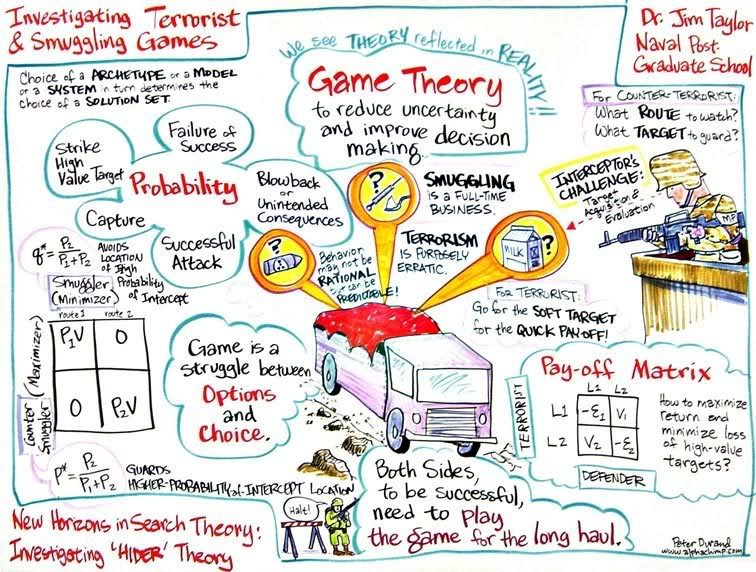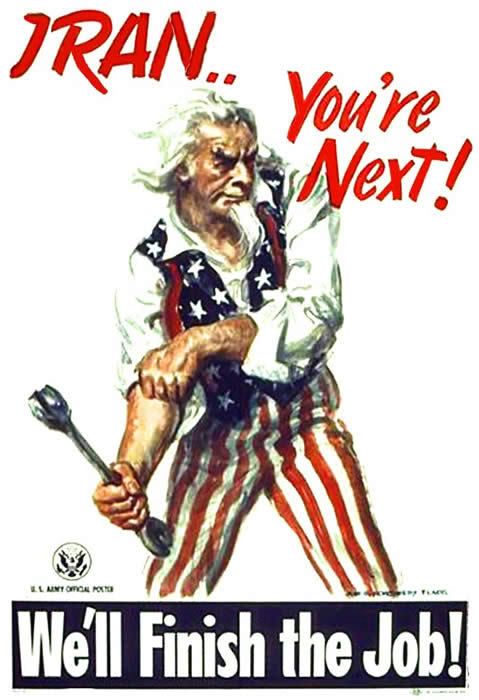Foreign Policy Magazine has teamed up with the Center for a New American Security and surveyed 3,400 active and retired officers in the US military (link). One of the questions was "What are the two most important things the US government must do to win the war on terror?" 73% of those who responded said "Improve Intelligence." Albeit that statistic is significantly high, it should be at 100%. It is because the US military is so powerful against conventional armies is why terror and insurgency groups rely on asymmetrical warfare. The US can not engage the these groups head-on, for they will only be worn down by numerous hit-and-run attacks . When the US has the ability to outsmart those groups will the tables be turned and that only comes from having a good, actionable intelligence.
Saturday, March 1, 2008
Wednesday, January 9, 2008
"You Will Explode In A Couple Of Minutes"
With the recent event involving Iranian speedboats threatening US Naval ships, it would be good to understand the Iranian naval strategy. Fariborz Haghshenass, for the Washington Institute for Near East Policy, put out a piece on Iran's Doctrine of Asymmetric Naval Warfare.
Posted by
Alex Taylor
at
1:14:00 PM
0
comments
![]()
Labels: Geopolitics, Iran, Military
Tuesday, December 25, 2007
The Turning of Tables
Saudi Clergy Turn On Al Qaeda December 20, 2007: Three years ago, Saudi cleric Salman al |
Posted by
Alex Taylor
at
7:11:00 PM
46
comments
![]()
Labels: Middle East, Military
Sunday, December 9, 2007
Playing Games with Iran
I came across this when doing some research in game theory. Andreas Blume at the University of Pittsburgh gives an example, through game theory, of what courses of action the US could take with respect to Iran.
--------------------
Iran and the West
Iran seeks to go forward with work on uranium enrichment.
The US and Europe are worried that having a uranium enrichment facility will eventually enable Iran to build a nuclear bomb.
A coarse description of their respective strategic options might be as follows:
1. The West can ignore the problem, engage in diplomacy, or act militarily.
2. Iran can give up their nuclear ambition, slowly develop its enrichment capabilities, or opt for rapid development.
Some thoughts about payoffs for the West-Iran Game:
1.We will choose to model the conflict as a zero-sum game. A note of caution: This deliberately ignores that there are numerous dimensions of common interest between Iran and the West.
2. It suffices to keep track of the payoff of only one of players (we’ll choose the West); the other player’s payoffs are the same, except with the opposite sign.
3. If Iran decides to give up its nuclear ambition, then ignoring what they do is a valid option for the West, which will be indicated by a positive payoff, 5, for the West. Recall that Iran’s payoff in this case must be −5.
4. Ignoring Iran’s ambitions is less attractive if Iran chooses slow, indicated by a negative payoff, -2, for the West.
5. The worst outcome for the West is to ignore the problem when Iran proceeds rapidly, indicated by a payoff of -6.
6. The best outcome for the West with diplomacy would be if Iran gave up its ambition. The worst outcome in this case would be if Iran kept slowly developing its enrichment capabilities. In the case that Iran proceeded
rapidly, it would then be possible to convince others, e.g. Russia and China, that diplomacy has been exhausted.
7. Military action, in the game we will set up, is the preferred option only in the event that Iran proceeds rapidly.
Give Up __Slow __Rapid
__________________West __ Diplomacy _____4 ____-1 ____1
_______________________________Act _____-5 ____-4 ____2
Consider the West’s decision problem first:
2. Against an omniscient adversary with diametrically opposed interests, the West’s payoff from diplomacy is -1.
3. Against an omniscient adversary with diametrically opposed interests, the West’s payoff from act is -5.
In this world, Iran will try to minimize the maximum payoff that the West can achieve against any of Iran’s strategies.
Recall our assumption that Iran’s goal is to minimize the maximum payoff the West can achieve against Iran’s strategy.
Observe that both the West and Iran can guarantee the payoff -1 in this game.
It appears as though Diplomacy is the best course of action.
Posted by
Alex Taylor
at
5:26:00 PM
0
comments
![]()
Labels: Critical Thinking, Game Theory, Geopolitics, Iran, Military
Friday, September 7, 2007
Former CIA Operative says US poised to strike Iran
Here is an article coming from Australian news services which has Bob Baer, a former CIA operative, stating that things are going to get hairy between the US and Iran.
Posted by
Alex Taylor
at
3:53:00 PM
8
comments
![]()
Labels: Intelligence, Iran, Military
Friday, July 27, 2007
Game Theory and The Iraqi Insurgency

Here is a great article from A Second Hand Conjecture that pulls together game theory and the use of the media in relation to the insurgency and counter-insurgency in Iraq.
Posted by
Alex Taylor
at
10:36:00 AM
3
comments
![]()
Labels: Game Theory, Iraq, Military
Wednesday, July 18, 2007
Thomas P.M. Barnett
The following 3 clips (sequential from top to bottom) are of a PowerPoint presentation by Thomas P.M. Barnett (author of The Pentagon's New Map and Blueprint for Action). If one is unfamiliar with him, Thomas Barnett synthesizes Huntington, Fukuyama, Clausewitz, and Friedman into what he sees as the future of international conflict relations. The lecture is 30 min total with a great deal of detail, but it goes by fast.
Posted by
Alex Taylor
at
7:58:00 PM
0
comments
![]()
Labels: Geopolitics, Military
Saturday, July 14, 2007
Should We Stay or Should We Go?
Warning: Dramatic Graphic Violence
The clip above is an advertisement that airs on Al-Arabiya TV denouncing Sunni-Shiite Terrorism in Iraq.
There was a New York Times editorial recently, The Road Home, that rattled my sense of logic and common sense. The premise of the article is that it is time for the United States to leave Iraq. This is the some of the usual rhetoric that is heard in most news coverage, but then the article goes into what happens if the US were to leave:
I agree with the analysis above, no argument there. But then the article goes on to say:That conversation must be candid and focused. Americans must be clear that Iraq, and the region around it, could be even bloodier and more chaotic after Americans leave. There could be reprisals against those who worked with American forces, further ethnic cleansing, even genocide. Potentially destabilizing refugee flows could hit Jordan and Syria. Iran and Turkey could be tempted to make power grabs. Perhaps most important, the invasion has created a new stronghold from which terrorist activity could proliferate.
But Americans must be equally honest about the fact that keeping troops in Iraq will only make things worse. The nation needs a serious discussion, now, about how to accomplish a withdrawal and meet some of the big challenges that will arise.
In other words, if the US stays it will get "worse." If the US leaves, Iraq will become a bloodier, more chaotic stronghold of terrorism and genocide which will probably devolve into a regional war. How is staying in Iraq "worse" than latter option? This doesn't make sense, if anything this should be an argument for why we SHOULD stay.
What is most interesting is the fact that people recognize that pulling troops from Iraq can lead to ethnic cleansing or genocide, but believe US should leave anyways. Yet, many of the same people turn around and say the US should intervene and stop the genocide in Darfur (the Democratic Debate anyone?). I agree the US (the help of NATO and the UN would be great too) should intervene in Darfur, but why shouldn't the US also stay and prevent a future Darfur-like situation in Iraq?
Posted by
Alex Taylor
at
1:34:00 PM
0
comments
![]()
Labels: Geopolitics, Iraq, Military
Friday, July 13, 2007
GOOD Nuclear Transparency
This excellent clip on nuclear weapons comes from GOOD Magazine. It sums up a great deal information with the use of graphics and vintage news clips. Plus, it uses one of my favorite RATATAT songs, "Gettysburg."
Posted by
Alex Taylor
at
6:08:00 PM
0
comments
![]()
Labels: Intelligence, Military



